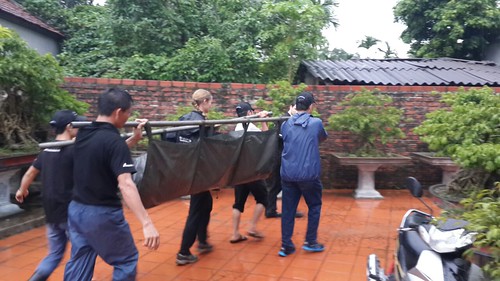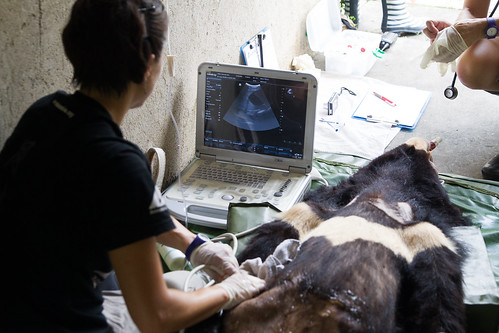“As the vet I have to keep it together – but inside my heart is breaking”
07 October 2015

The new senior vet at Animals Asia’s Vietnam sanctuary hit the ground running – helping to rescue seven bears in her first week.
Mandala Hunter-Ishikawa is the latest vet to join our Vietnam team, and she brings incredible experience, most recently at Animals Asia’s China sanctuary.
Her experience paid off during the recent Quang Ninh rescue from local bear bile farms, in which she played a key role in bringing the bears back to the sanctuary – including one bear that needed anaesthetising to release him from his cage.
It proved to be a historic week for the Animals Asia Vietnam team. Twenty-four hours earlier Animals Asia’s founder and CEO Jill Robinson had announced an agreement with the Vietnam Traditional Medicine Association to end their use of bear bile. It’s a move that paves the way for bear bile farming to end in Vietnam.
In China Mandala was a resident vet looking after 122 bears, many of them ageing or living with conditions caused by years spent being farmed for their bile. She helped ensure bears had a good quality of life, despite traumatic years spent in a cage.

Born in Japan to an American mother and a Japanese father, Mandala moved to the US aged eight and was educated at Colorado State University in the US, earning her Bachelor’s, Master’s and eventual Doctor of Veterinary Medicine degrees. She first entertained the idea of being a wildlife veterinarian while studying abroad in Botswana – spending a semester on a Wildlife Ecology and Conservation course.
It wasn’t a straight path from there to Animals Asia. To transition her knowledge and experience in domestic veterinary medicine to working with wildlife, Mandala spent seven years in a rural mixed animal practice in northern Idaho, in a small mining and logging community. The experiences she had there, both in practising medicine and in cultivating connections with the community around her, are the exact things that have made her so valuable to the Animals Asia team.
Mandala said:
“It’s hard sometimes on rescues because I believe you become a vet because you do have empathy for animals. Yet, when you’re needed to ensure a bear’s safety on a rescue you absolutely have to zone in. As the vet I have to keep it together – but inside my heart is breaking for these bears.
“The bears at sanctuaries are the ambassadors for those still on farms. They are the face of the campaign, and being able to show their progress from sick, miserable bears to happy animals playing in a community of other bears shows what a little kindness can do. It shows people that bears deserve better than to have people treat them this way.
“The rescued bears have a variety of medical issues, ranging from chronic arthritis to dental disease to mental disorders, from their years of boredom and abuse on the bile farm. As a vet, we perform surgeries and monitor medications on the bears and make the lives of these animals the best that we can. We work closely with a dedicated bear behaviour staff to ensure that every part of the bear is being taken care of, both physically and mentally.
“It’s truly an amazing place to work. I am surrounded by people who care about animals, who believe that we can make a change, and are doing something about it.”
Vietnam still has 1,245 captive bears on bile farms – in China there remain over 10,000. Animals Asia has rescued over 550 bears, and continues to care for 384 in sanctuaries in China and Vietnam.

BACK






 Healing the hidden wounds
Healing the hidden wounds
 Early summer awakening at the China Bear Rescue Centre
Early summer awakening at the China Bear Rescue Centre
 5 reasons the dog meat trade must end
5 reasons the dog meat trade must end